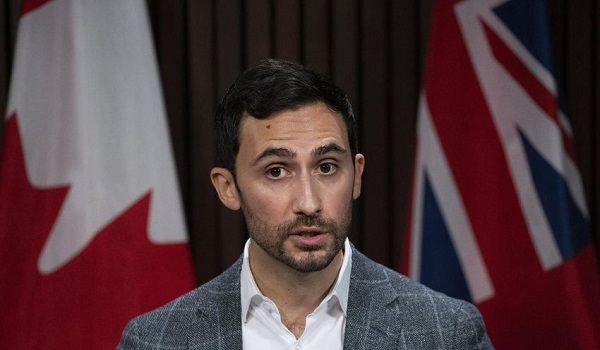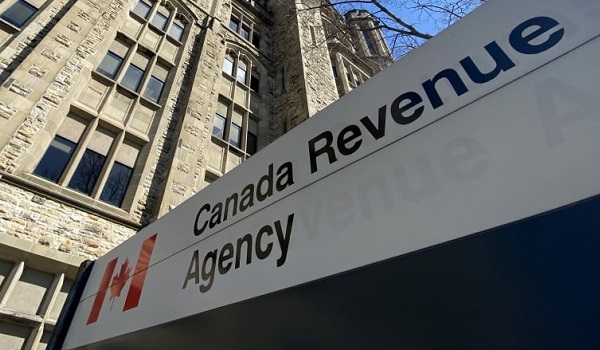Locked college doors, foreign students and the chase for Canadian work permits
On a desolate industrial park off a highway north of Toronto stands the Vaughan campus of Flair College of Management and Technology. The boxy façade of the business college is adorned with images of students cooking, at a computer screen, or wearing virtual-reality goggles. Yet the only sign of real life is a woman smoking a cigarette on the steps next door. It is a school day in late January, but the college doors are locked.
Flair’s other campus is in a Brampton strip mall that advertises an optometrist, a dental hygienist and a vascular institute. This at least looks open.
There are two pieces of paper taped to a wall. One directs the visitor downstairs to a busy clinic offering “Immigration Medicals,” the other to Flair College, toward a suite in the basement where no one has quite bothered to move in. Only one room, as big as a decent-sized bedroom, resembles a classroom with chairs and a desk at the front, where a woman sits glued to her phone.
The women’s washroom has no soap or bathroom tissue. There are two television boxes and a desk in an empty office that looks as if it has never been used. One classroom is empty, except for a couple of desks stacked against the wall. There are no students, just a queue from the immigration medical clinic snaking into the corridor.
The rest of the campus turns out to be tucked away upstairs near the mall’s pharmacy. Here there are more signs of life, including a staffed reception desk and an office where the college’s executive director, Sandip Dhakecha, sits. In one classroom, a small group of students mainly from India listen to a lecture.
The college’s “vision” is emblazoned on the outside of a door: “We Aim to be the Primo in Facilitating Ethical, Progressive and World-Class Education.” Its mission – accentuated with more capital letters: “Helping our learners to become Employable and Better Citizens of the World.”
“We inculcate wisdom over bookish knowledge among Learners,” it adds.


The college’s website, which lists both the Vaughan and Brampton campuses, encourages international students to apply to study in Canada.
“Canada needs your culinary skills,” it says. “Provinces such as Alberta, Manitoba, New Brunswick and Saskatchewan are searching for talented individuals in the culinary sector who want to live and work in Canada. If you are eligible and receive an ITA [Invitation to Apply] for permanent residence in Canada both you and your family will have access to all of Canada [sic] amazing benefits, such as free public healthcare and education up until grade 12.”
It continues “As a skilled or semi-skilled worker, you can choose from over 70 different immigration programs and visas, giving you a better chance to start a new life for you and your loved ones abroad.” It adds that to navigate a complex system, “using a paid government-regulated immigration consultant is so important to secure your place in Canada.”
Around 70 per cent of the students at the college are from overseas, Mr. Dhakecha says. But few seem to be in class today, even though more than 1,800 study permits were issued for the college by Immigration, Refugees and Citizenship Canada (IRCC) last year.
‘Where are all the students?’ I ask the affable Mr. Dhakecha, pressing him on why there is no one at all at the college’s Vaughan campus.
He is happy to explain. About three-quarters of the international students who are accepted and come to Canada on a study permit do not attend any classes but apply immediately for their fees to be refunded. They then transfer to a public college where they would qualify for a postgraduate work permit (PGWP), he says.
Students attending public colleges qualify for the coveted work permits, which allow graduates to stay in Canada to work and start on the path to permanent residence.
Immigration Minister Marc Miller last month tightened up the system for international students, placing a cap on numbers and ending private-public partnerships, which allowed private colleges that cannot offer a postgraduate work permit to team up with eligible public colleges.
Mr. Miller’s changes follow pressure on Ottawa to reduce international student numbers to ease the housing crisis, and polls that show flagging public confidence in the immigration system.
Mr. Dhakecha fears the crackdown will further depress the number of international student numbers at the college. Some of Flair’s students, after arriving in Canada, stay at the college for only a few weeks or months, he says. They then get a partial refund before moving on to a school that will allow them to stay and work in Canada, with others completing a diploma before moving to a public college.
“To be honest with you, they are just using us to get here,” says Mr. Dhakecha. “Eventually everybody is going to public college. Thirty to 40 per cent stay here and sometimes they stay for one semester.”
The students being taught in the small classroom nearby, he says, are part of the new January intake of students who “are in the process of applying for a refund.”
Mr. Dhakecha says the exodus happens in spite of earnest efforts to retain students with initiatives such as job placements. But for private colleges, which do not provide a route to a work permit upon graduation, it is now “a question of survival.”
He says he has applied to the Ontario government, which licenses the college, to close its Vaughan campus, where culinary courses were previously taught, because of a lack of international students.
“The problem is that very few of them were coming, sustaining until graduation. The ministry is issuing a study permit so the student can come here. And then we have no tool to retain them,” Mr. Dhakecha says.
“Obviously we are running classes. We want to teach. You can see … we are running a small class. We have a total of eight classrooms.”
International students who come to Canada on study permits need to show they are actively pursuing their studies, and are enrolled full- or part-time during each academic semester. They must also show they are making progress toward completing their courses, according to IRCC.
An internal IRCC report from November, 2021, put Flair College in the top five colleges in Canada for potential student non-compliance. The Student Integrity Analysis report, obtained by immigration lawyer Richard Kurland through an access to information request, found that Flair had a “no show” rate of 75 per cent of students.
With most of its international students leaving before they even sit down in a class, how does the college make money?
Mr. Dhakecha says that those asking for a refund before starting the program have to pay $495. And those who stay on to study for part of their course pay some of their fees. They can apply for a refund until the midpoint of their course.
Capping international student numbers will only increase the strain on hard-pressed private career colleges, Mr. Dhakecha says. What is really needed to stop the exodus of students is to allow them to qualify for postgraduate work permits, so graduates can stay and work in Canada.
On paper, Flair’s popularity among international students rocketed last year, with 1,867 study permits issued to international students, mainly from India. That compared with 189 in 2022 and only 45 in 2021.
The surge may in part be because of its new owner Anurag Sachdeva, an immigration consultant. He took over the college in 2022 and is also director of education companies including UnizPortal, which provides online information and application services for international students interested in applying to universities and colleges in Canada, New Zealand and Britain.
UnizPortal is flagged on Flair’s website as a “global application partner” of the college.
Mr. Sachdeva says UnizPortal does not funnel students to Flair, nor, as an immigration consultant, does he help students apply for permits to study there. He, too, is open about the students’ high exodus rate, saying it is troubling because the college has to make “all the effort” – including paying teachers’ salaries – and “then they come here and then they tend to leave.”
He says if the government were to allow its students to qualify for postgraduate work permits, it would “create a level playing field” with public colleges. “The work permit is the number one hook for the students to come and stay here,” he says.
“It becomes very difficult to make the student stay with us because, ultimately, they know that they will not be eligible for the PGWP after their studies. So that’s why they just come, and they leave.”
“At the end of the day, international students, it’s their right if they want, they can go to another school or move to another program.”
He also suggests Ontario create a smoother pathway to permanent residence as a way of competing with other provinces and keeping students at their desks.
“Some of the provinces are more attractive right now as compared to Ontario,” he says. “A work permit is always the number one thing which will make the students to continue the study rather than just leaving.”
The previous proprietor of Flair was another immigration consultant, Vishal Manocha, the new owner of A1-Global College of Health, Business & Technology in Mississauga.
The college is located in the Great Punjab Business Centre, which includes multiple immigration consultants, job centres, law offices and an impressive statue of Maharaja Ranjit Singh, the founder of the Sikh empire, on horseback.
Like Flair, the college seems virtually empty, with only one young woman student in evidence. A staff member explains that most of the students are currently studying online, although practical classes are held in the building.
Mr. Manocha, who bought the college in September last year, says he is in the process of revamping it. He is proud of the courses the college offers, saying that its personal support worker training is much in demand, and that students have a strong record of getting work placements and jobs.
The college’s website, when The Globe spoke to Mr. Manocha, featured a photo of a grand neo-classical red-brick campus, with students carrying books on its grassy grounds. This bears little resemblance to A1-Global′s more modest premises next to a realty brokerage. Mr. Manocha says he plans to change the website and remove the image that predates his ownership.
The website gave the option for international students to apply, with the application form asking if they have a study permit. But Mr. Manocha says A1-Global now almost exclusively caters to domestic students, which is borne out by the college’s study-permit figures. But there are a few applications from international students already within Canada with study permits.
“We don’t give any letter of acceptance to somebody in India to get a visa to study at A1-Global College,” he says. “We are not giving any acceptance outside of Canada.”
Across the private-college sector, the Immigration Department has been investigating the problem of fake acceptance letters issued to international applicants that enable them to obtain study permits so they can enter Canada. Investigators found some international students living in Canada were not in fact studying at the colleges at which they applied to attend.
Mr. Manocha says he is aware of “what is going on in the market,” but that his college is most definitely not into “any sort of fishy business.”
“I know private colleges in Canada who don’t even have a staff sitting there. They are actually puppet shows,” he says. “I cannot name anybody but I know people are doing it. That’s for the ministry to go after them.”
In a statement issued later, Mr. Manocha added A1-Global has been “a reputed career college running for over 30 years in Mississauga, dedicated to education and contributing to the healthcare and education workforce. Our focus at A1 college is on local Canadian citizens/permanent residents students looking to start or enhance their career/learn new skills … with no focus on international students.”
While many of the private colleges licensed by the Ontario government are in strip malls such as the one housing A1-Global, the central Toronto campus of the Academy of Learning Career College is in a smart tower block steps from the Old City Hall downtown.
Its reception bears more resemblance to a city law firm than an academic institution. Staff business cards sit on the gleaming white front desk and photos of faculty, including those in its immigration consultant and business programs, are displayed on the wall.
But today the campus is preternaturally quiet, with not a student in sight. Its answering-machine message still says classes are being held online because of the pandemic.
Chamara Perera, chief operating officer, says the private career college is now “in the process of transitioning back to in-person classes” and is running a “hybrid delivery method.”
“Students come to the campus as per the program requirements,” he says in a statement. The college’s courses include IT, accounting, English as a second language and an immigration administrative assistant program.
The Academy of Learning is a franchise and among the courses advertised on its website is “introduction to keyboarding,” which requires a minimum typing speed of 10 words a minute to pass the online exam.
The IRCC’s November, 2021, Student Integrity Analysis report puts Academy of Learning in Toronto in the top five for potential student non-compliance, with a 90 per cent “no show” rate.
Mr. Perera says that 95 per cent of its 2,200 students are currently from Canada, with very high retention and graduation rates.
But in 2019 there were a “huge number” of international students who did not complete the college’s program, he explains, because, as a private career college, students would not get a work permit upon graduating.
“So the students when they reach here, they move to different public schools for getting the PGWP. Thereafter, we reduced our international recruitment to lower numbers,” he says.
Contrast the antiseptic silence of this ultra-modern college with the bustling Stanford International College of Business and Technology campus.
Stanford is located on a busy junction opposite a gas station in Mississauga. The red-brick campus is packed with international students, including those studying hospitality or training to be gas fitters. Students with backpacks jostle and chat animatedly in Punjabi in the hallway and busy reception, others spill out onto the parking lot and crowd the bus stop outside.
But the droves of students are not technically studying at Stanford College, a designated learning institution. They are instead registered at the affiliated Canadore College @Stanford, which offers postgraduate work permit-eligible programs.
IRCC figures reflect the popularity of Canadore, based in North Bay, Ont., with 5,864 study permits issued in 2023 and another 3,983 international students successfully applying to extend their permits. Students who come to Canada with study permits for other colleges can apply to transfer to Canadore after a semester.
Immigration consultant Earl Blaney says the surge in international student numbers in recent years is in part because of aggregators that earn commissions for linking them to schools. And the option of a work permit – a step along the path to permanent residency – is a huge draw to the many who want to settle in Canada.
But Mr. Blaney questions whether it is a good idea for immigration consultants and people with companies involved in international student recruitment to also run colleges because of the potential for conflicting interests.
For his part, Mr. Sachdeva says he thinks international students should focus on their college courses, rather than gaining residency in Canada.
“That’s what we tend to tell all of our students,” he says. “When you are a student, your principal activity is to study, not to just think about working or not to think about how you’re going to get the permanent residence.”
This article was reported by The Globe and Mail















